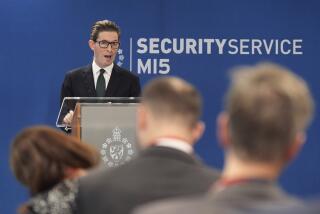Londoners Caught in Glare of Global Spotlight on Blair
- Share via
LONDON — Blitzed during World War II and bombed repeatedly by the Irish Republican Army, London sees itself on the front line once again.
With Prime Minister Tony Blair taking a prominent role in the U.S.-led war on terrorism, the capital is considered a prime target for extremists who might seek retribution, and Londoners’ nerves are on edge.
A police cordon surrounded the City of London financial center Monday, landmark buildings were under heavy surveillance, and guards were on high alert in the London Underground subway system, searching stations every 15 minutes. While increasing security, the British government urged residents to go about business as usual.
“We ask people to be vigilant and calm and go about their normal business. That’s the only way of defeating the terrorists,” Foreign Secretary Jack Straw said.
By and large, Londoners did, although with reservations.
“It’s always at the back of your mind that there could be an attack here, and if there is, where it’s going to be,” said Rob Coleman, 33, a British financial analyst in the City.
Public anxiety intensified after an accidental plane crash Monday in Milan, Italy, in which 118 people died, and the emergency landing of a London-bound Saudi Airlines jet in Rome after a bomb threat was telephoned into Heathrow Airport. No bomb was found, but the events fueled the nervous fire.
“I’m panicking a little because I’ve got to fly to Milan on Wednesday,” said Simon Sherard of the Counter Spy Shop in the upscale Mayfair district.
Like his counterparts in the United States, Sherard said he had sold three gas masks at his shop in the previous three years but 400 in the last two weeks amid fears of a chemical or biological attack.
Other cities in Britain and Europe also have beefed up security, particularly around U.S., British and Israeli interests, train stations, airports and shopping centers. But none feels as vulnerable as London.
“Mr. Blair has made us quite a high-profile target,” said Clive Weeks, 68, who was meeting a colleague outside the Bank of England. “He has been more outspoken than the leaders of France, Italy or Germany.”
Much concern centered on the Underground, which provided shelter to besieged Londoners during World War II air raids and is an integral part of daily life for an estimated 1.5 million commuters.
“Any suspicious packages must be reported to local staff immediately,” says a voice over the loudspeaker at the Gloucester Road station, which services three of the city’s 12 subway lines.
“We’ve been put on full alert,” said South Kensington assistant station manager Dil Miah. “That means extra workers, and we do security checks every 15 minutes instead of every hour, and there are two people monitoring [closed-circuit television cameras].”
Many commuters said they try to avoid the busiest stations--Oxford Circus or Piccadilly Circus--or leave the office early and stay late to avoid peak travel hours that might be the pick of terrorists.
Others say these decisions assume a logic to terrorism, which by its very nature, they say, is irrational.
Londoners are accustomed to bomb scares and to the sudden evacuation of a building or an Underground station. They are also used to bombs--three this year attributed to Irish dissidents exploded near an army base, at the BBC television headquarters and in the Ealing Broadway neighborhood. Last year, presumed Irish dissidents fired a small antitank missile at the MI6 intelligence headquarters on the Thames.
“You just get on with it,” said Underground commuter Laura Corrigan.
At the same time, Londoners acknowledge that nothing on the scale of the World Trade Center attack has ever happened here. One mind game affecting them is an apocryphal tale that has been making the rounds, in which a Middle Eastern-looking man asks a woman for change. When she gives it to him, he says he wants to repay her kindness with a warning: “Stay out of central London.” In some of the versions, he tells the woman to “keep away from the West End.” Or a specific date is given.
Scotland Yard cannot confirm whether there was ever a first-hand report of this happening, but it has received many of the rumors, and the tale has taken on the appearance of psychological warfare.
Police and political leaders repeatedly say they have no warning of a specific threat to London or any other site in Britain.
But Britons know there was no warning of the attacks on the World Trade Center and the Pentagon. They know their own tall buildings at London’s Canary Wharf and the City’s Commercial Union Building were bombed by the IRA in the 1990s.
Since then, the City has been surrounded by a cordon of fences, security cameras and police checkpoints. Access is normally monitored and controlled. Now, private security guards and electronic building passes have been added.
While bobbies protect mosques and Muslim centers against possible racist attacks, sniffer dogs and police on horseback patrol the area around Canary Wharf, where evacuation plans are under review in the wake of the World Trade Center attacks.
“Security is very tight. People are very somber,” said an American financial analyst who works in the area. “We were starting to be more ourselves, but now people are very down again.”
In trying to comfort people, Home Secretary David Blunkett laid out a host of possibilities for terror attacks: “Whether it’s electricity and water supplies, whether it’s ensuring that hospitals have the necessary equipment available, people can be assured we’re doing our job to protect and to prevent the worst of catastrophes occurring.”
*
Times staff writer Emmanuelle Soichet and Janet Stobart in The Times’ London Bureau contributed to this report.
More to Read
Sign up for Essential California
The most important California stories and recommendations in your inbox every morning.
You may occasionally receive promotional content from the Los Angeles Times.












